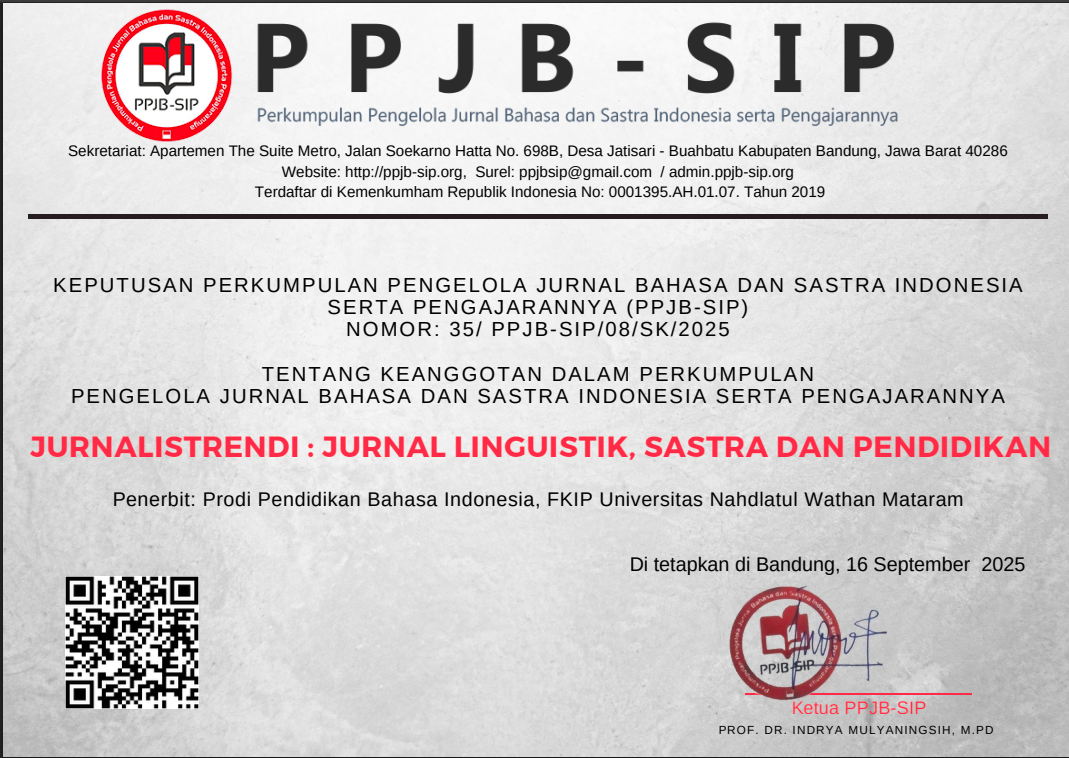Analisis Hierarki Kebutuhan Tokoh Novel Pesantren Impian Karya Asma Nadia
Abstract
The problem raised in this study is the hierarchy of needs of the characters in the novel Pesantren Impian by Asma Nadia and its relation to literature learning in high school. The novel Pesantren Impian is analyzed using Abraham Maslow's theory. This study aims to determine the fulfillment of Abraham Maslow's hierarchy of humanistic psychology needs in the novel Pesantren Impian by Asma Nadia. The method used is a descriptive qualitative approach by reviewing the content of the novel and identifying data on the hierarchy of needs of the characters in the novel. The data source of this research is the novel Pesantren Impian by Asma Nadia published by Asma Nadia Publishing House in 2014. Data collection is done by reading and recording techniques, namely by reading the novel and recording the results of data identification contained in the novel. The results obtained are in the form of descriptions of the level of needs of the novel's characters as a mirror of human needs. The hierarchy of needs includes (1) physiological needs, (2) security needs, (3) love and belonging needs, (4) appreciation needs, and (5) self-actualization needs. Based on the results of this study, the description of the hierarchy of needs of the characters in the novel becomes one of the references for analyzing the psychological aspects of characters in other types of literary works.
Downloads
References
Aminuddin. 2013. Pengantar Apresiasi Karya Sastra. Bandung. Sinar Baru. Andea Hirata dan Relevansi dengan Pembelajaran Sastra di SMA kelas XI semester II. Pendidikan Bahasa dan Sastra Indonesia Universitas Sanata Darma.79
Djojosuroto, Kinayati. 2010. Pendidikan Karakter Melalui Karya Sastra.Jakarta : Fakultas Bahasa dan Seni, Universitas Negeri Jakarta.
Endaswara, Suwardi. 2005. Metode penelitian Sastra. Yogyakarta: Med press.
_______ 2008. Metode peneliti
an Sastra. Yogyakarta: Med press
Feist, Jess. 2014. Teori Kepribadian hlm 331: Theories of Personality. Salemba: Humanika.
Frank G. Goble,1987.Mazhab ketiga Psikologi Humanistik Abraham Maslow. Penerjemah A. Supratiknya. Yogyakarta: Kanisius.
Hadi, S. 2017. Pemeriksaan Keabsahan data penelitian kualitatif pada skripsi. Jurnal Ilmu Pendidikan, 22(1).
Kanzunnudin, Mohammad. 2011. Bahasa Indonesia untuk Perguruan Tinggi. Rembang: Yayasan Adhigama.
Maslo Abraham H., 1984. Motivation and Personality (Teori Motivasi dan Kepribadian). Yogyakarta: Cantrik Pustaka, cet: 1
Melati, T. S., Warisma, P., & Ismayani, M. 2019. Analisis Konflik Tokoh Dalam Novel Rindu Karya Tere Liye Berdasarkan Pendekatan Psikologi Sastra. Parole (Jurnal Pendidikan Bahasa Dan Sastra Indonesia), 2(2), 229-238.
Minderop, Albertine. 2011. Psikologi Sastra. Jakarta: Yayasan Pustaka Obor Indonesia.
_______ Albertine. 2016. Psikologi Sastra. Jakarta: Yayasan Pustaka OborIndonesia.
Nadia, Asma. (2014). Pesantren Impian. Depok: Asma Nadia Publising Haouse.
Nurgiyantoro, Burhan. 2010. Teori Pengkajian Fiksi. Yogyakarta: Gajah Mada Universiy Press.
_______ 2018. Teori Pengkajian Fiksi. Yogyakarta: Gajah Mada University.
Oemarjati, Boen S. 1992. Dengan Sastra Mencerdaskan Siswa: Memperkaya Pengalaman dan Pengetahuan. Jakarta: Pustaka Sinar Harapan.
Purba, Antilan. 2001. Sastra Kontemporer. Medan: USU Press.
Rahardjo, M. 2011. Metode Pengumpulan Data Penelitian Kualitatif.
Schultz, Duane. 1991. Psikologi Pertumbuhan- Model- Model Kepribadian Sehat (Terj.).Yogyakarta: penerbit Kanisius.
Sudaryanto. 2019. Metode dan Aneka Teknik Analisis Bahasa (Pengantar Penelitian Wahana Kebudayaan Secara Linguistis). Yogyakarta: Duta Wacana University Press.
Sugiono, 2018. Metode Penelitian Kuantitatif, Kualitatif, dan R&D. Bandung: Alfabeta, cet: 28
_______ 2019. MetodePenelitianKuantitatif, KualitatifR&D.Bandung:Alfabeta.
Setiawan, H. 2014. Manusia Utuh: Sebuah Kajian Atas PemikiranAbraham Maslow.
Warren, Austin dan Rene Wellek. 1995. Teori Kesusastraan. Jakarta : PT. Gramedia Pustaka Utama.
Zed Mestika, 2008. Metode Penelitian Kepustakaan. Jakarta: Yayasan Obor Indonesia
Copyright (c) 2024 Jurnalistrendi : Jurnal Linguistik, Sastra dan Pendidikan

This work is licensed under a Creative Commons Attribution-NonCommercial 4.0 International License.

.jpg)





